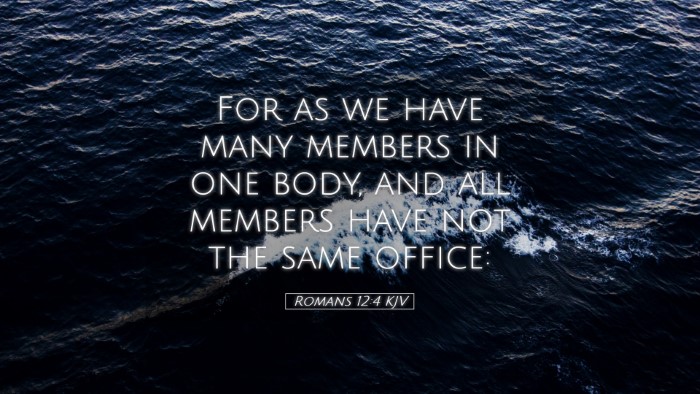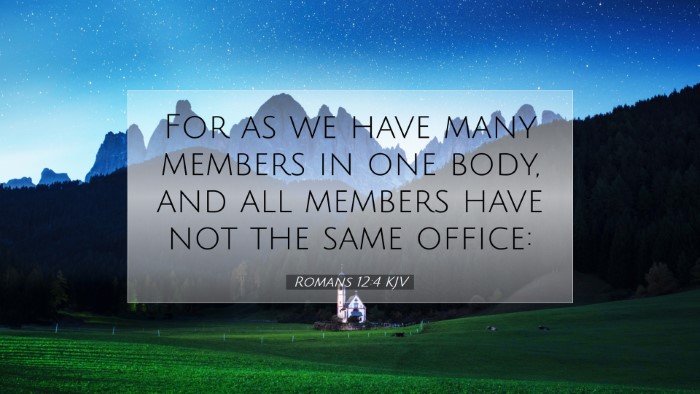Old Testament
Genesis Exodus Leviticus Numbers Deuteronomy Joshua Judges Ruth 1 Samuel 2 Samuel 1 Kings 2 Kings 1 Chronicles 2 Chronicles Ezra Nehemiah Esther Job Psalms Proverbs Ecclesiastes Song of Solomon Isaiah Jeremiah Lamentations Ezekiel Daniel Hosea Joel Amos Obadiah Jonah Micah Nahum Habakkuk Zephaniah Haggai Zechariah MalachiRomans 12:4
Romans 12:4 KJV
For as we have many members in one body, and all members have not the same office:
Romans 12:4 Bible Commentary
Commentary on Romans 12:4
Scripture Reference: Romans 12:4 - "For as we have many members in one body, and all members have not the same office."
Introduction
This verse forms part of Paul’s profound exhortation to the church at Rome regarding the nature of Christian community and the diversity of gifts given to believers. In this statement, the Apostle uses the analogy of the human body to illustrate how Christians function collectively in the Body of Christ. This commentary seeks to draw from various public domain sources to explore the theological implications and practical applications of this verse.
Analyzing the Metaphor of the Body
Paul’s imagery of the body conveys a vital implication: just as a physical body consists of numerous parts that each have distinct roles, so too does the church consist of various members who are endowed with different gifts and functions.
Matthew Henry emphasizes that "the body is one, but it has many members," indicating that unity does not negate diversity. Each member is essential and plays a crucial role in fulfilling the body’s overall function.
Albert Barnes elaborates on this by noting the interdependence of members, asserting that no member can function fully without the others. This mutual dependency nurtures the body, fostering both unity and individuality within the church community.
Adam Clarke adds that this analogy encourages believers to recognize their unique contributions while also humbling themselves in service to the whole. The multifaceted nature of the Body of Christ reveals God's wisdom in structuring the church, ensuring that every member fulfills a divine purpose.
Understanding "Many Members, One Body"
The phrase "many members" suggests diversity among believers. Each individual's unique gifts, experiences, and roles enrich the church.
This concept aligns with the Corinthian correspondence (1 Corinthians 12:12-27), reinforcing the principle that each member is integral to the body.
Matthew Henry points out that Christians should not envy one another's gifts but embrace their own roles within the body.
Albert Barnes notes that some may be inclined to see their gifts as less significant due to the prominence of others. Yet, every function is pivotal, similar to how even the smallest body parts are essential for health and function.
The Importance of Recognizing Individual Functions
Paul also highlights that "all members have not the same office." Here, we understand the importance of recognizing the specific functions assigned to different members. Adam Clarke suggests that this differentiation is crucial for the church's effectiveness. Each member has a unique calling, and understanding one’s role leads to greater harmony and productivity within the community.
Matthew Henry stresses that this divergence in roles should not lead to division but rather a celebration of God’s diverse grace. Each member's service, irrespective of its visibility or acclaim, contributes to the greater good.
Implications for Church Leadership and Function
The metaphor of the body implies that churches should cultivate an environment where members actively discover and exercise their gifts. Albert Barnes advises church leaders to foster a culture of encouragement and recognition, enabling all members to contribute their unique abilities for the community’s benefit.
Furthermore, as Adam Clarke points out, the church must honor and respect every function, ensuring that no member feels inferior or insignificant. This leads to a sense of belonging and encourages participation from every member.
Application for Personal and Corporate Life
From a personal perspective, believers should reflect on their gifts and how they can be utilized within the church context. Matthew Henry encourages individuals to discern their spiritual gifts through prayer and community feedback. Similarly, Albert Barnes urges believers not to shy away from serving in their capacities, regardless of their perceived significance.
Collectively, churches should commit to regular assessment of gifts and roles, engaging in dialogues that promote collaboration and support. Adam Clarke suggests that such engagement informs teaching and discipleship efforts, allowing congregations to grow together in understanding and effectiveness.
Conclusion
Romans 12:4 stands as a powerful reminder of the beauty of diversity within the church, encouraging individuals to recognize their unique contributions while cherishing the essential unity of the body.
The insights from public domain commentaries underscore the notion that while we are diverse, we are also bound together in Christ, with each member playing an invaluable role in the church’s mission.
As we heed Paul’s exhortation, may we strive for unity amid diversity, celebrating our shared faith and embracing our distinct functions for the glory of God.


